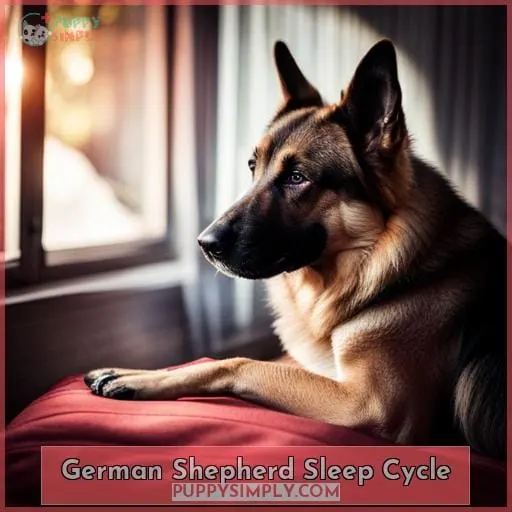This site is supported by our readers. We may earn a commission, at no cost to you, if you purchase through links.
 Do you wonder how much sleep your German Shepherd needs each day?
Do you wonder how much sleep your German Shepherd needs each day?
Their sleep schedule varies depending on their age and activity level.
In this article, we’ll explore:
- The recommended amount of sleep for German Shepherds
- How their sleep patterns change as they grow
- Factors that can affect their sleep
We’ll also discuss:
- The importance of sleep for your furry friend’s health and well-being
- Tips for creating a sleep-friendly environment for your German Shepherd
Table Of Contents
- Key Takeaways
- German Shepherd Sleep Schedule
- German Shepherd Puppy Sleep
- German Shepherd Sleep Cycle
- German Shepherd Sleep Habits
- Sleeping With a German Shepherd
- Factors Affecting a German Shepherd’s Sleep
- German Shepherd Sleep Problems
- Frequently Asked Questions (FAQs)
- How can I help my German Shepherd puppy sleep through the night?
- What are some signs that my German Shepherd is not getting enough sleep?
- How much sleep does a German Shepherd need during different life stages?
- What are some common reasons why German Shepherds sleep excessively?
- How can I create a comfortable sleeping environment for my German Shepherd?
- Conclusion
Key Takeaways
- German Shepherds typically sleep 12-14 hours per day, with puppies needing more sleep than adult dogs.
- A consistent routine, comfortable sleeping area, and avoiding disturbances are important for a good night’s sleep.
- German Shepherds have shorter, more frequent periods of deep sleep compared to other breeds.
- Factors such as age, health, and lifestyle can affect a German Shepherd’s sleep habits.
German Shepherd Sleep Schedule
You’ll observe that your German Shepherd puppy sleeps for about 15 to 20 hours each day.
In fact, sleep is essential for your furry friend’s growth and development.
As your puppy matures, their sleep duration decreases, and their sleep patterns become more regular.
Generally, adult German Shepherds sleep for around 12 to 14 hours daily.
However, this can vary depending on their age, lifestyle, and overall health.
Establishing a consistent sleep routine for your German Shepherd is crucial to ensure they get the rest they need to stay happy and healthy.
This means providing them with a comfortable and quiet sleeping area, avoiding disturbances during their sleep, and ensuring they get plenty of exercise throughout the day.
German Shepherd Puppy Sleep
Let’s begin our discussion of German Shepherd puppy sleep.
How much sleep does your puppy need?
It’s important to know that puppies typically sleep for 12-18 hours per day.
We’ll explore how exercise, routine, crate training, and age can affect their sleep patterns.
Daily Routine
Now that we’ve discussed the German Shepherd sleep schedule, let’s take a look at a sample daily routine for a 6-month-old puppy named Link:
8 am: Link wakes up, uses the bathroom, eats breakfast, and then crashes for a cozy nap.
9 am – 11 am: Link takes a nap.
1 pm – 3:30 pm: Link enjoys an afternoon siesta after a 1-hour walk.
6 pm: Dinner is served.
8 pm: Link goes for another brisk walk.
11 pm: Link drifts off to dreamland and sleeps soundly through the night.
Comparison With Other Puppies
Alongside Link, you can also examine other German Shepherd puppies like Diego and Emma to compare their sleep patterns.
Diego, a 5-month-old GSD, snoozes for about 23 hours daily.
11-month-old Emma also enjoys extensive sleep.
Some pups, like Apollo, have shorter sleep periods throughout the day.
These comparisons highlight the variability in sleep needs among individual German Shepherd puppies.
Factors Affecting Sleep
The amount of sleep your puppy gets can be influenced by factors like:
- The amount of exercise they get
- The routine you establish
Environmental conditions, daily routines, physical activity, and dietary influences can also affect their sleep patterns.
Providing a comfortable and quiet sleeping space, maintaining a consistent daily routine, and ensuring regular exercise can help promote restful sleep for your German Shepherd puppy.
As they age, their sleep patterns may change, so it’s important to monitor their sleep habits and adjust their routine accordingly.
German Shepherd Sleep Cycle
Unlike your own sleep cycle, which consists of several REM cycles, your German Shepherd’s sleep cycle consists of only two REM cycles, each lasting about six minutes.
This means that your furry friend experiences shorter, more frequent periods of deep sleep.
Understanding these canine sleep patterns can help you provide a supportive environment for your German Shepherd’s rest and well-being.
The duration of your German Shepherd’s sleep depends on their age, health, and activity level.
Puppies and seniors tend to sleep longer than adult dogs, and dogs with health conditions may experience excessive sleepiness.
Additionally, the temperature of their environment can influence their sleep; they may sleep more in hot weather to conserve energy.
Your German Shepherd’s sleep environment also plays a crucial role in the quality of their rest.
Providing them with a comfortable, draft-free space with adequate bedding can promote relaxation and restful sleep.
Furthermore, establishing a consistent routine and avoiding disturbances during their sleep can help them develop healthy sleep habits.
Lastly, pay attention to your German Shepherd’s behavioral cues to understand their sleep needs better.
Yawning, pacing, and circling are common signs that they may be tired and ready for a nap.
Providing them with opportunities to rest throughout the day can prevent overtiredness and promote overall well-being.
German Shepherd Sleep Habits
You’ll witness two unique sleeping positions in your German Shepherd:
- Curled up tightly, which helps retain heat and provides a sense of protection.
- Stretched out on their bellies, which, though less common, indicates comfort and confidence.
Environmental factors play a role in your dog’s sleep quality too:
- They may seek cooler spots during hot weather.
- They may cuddle up with you for warmth when it’s chilly.
Sleep duration varies depending on your Shepherd’s age:
- Puppies and seniors typically sleep longer than adults.
Behavioral changes and sleep pattern disruptions can signal underlying health issues, so it’s crucial to monitor your dog’s sleeping habits closely. If you notice significant changes, consult your veterinarian to rule out any medical causes.
Sleeping With a German Shepherd
Sharing your bed with your German Shepherd can bring comfort, security, and health benefits.
Consider any allergies you may have, as well as your dog’s training and behavior, before making this decision.
Sleeping with your dog may not be suitable for everyone.
Benefits
Often, you’ll find comfort and security when sleeping with your German Shepherd.
More than that, you may find your emotional stability and stress levels improve.
Sleeping with your furry companion can boost your immune function, promote cognitive enhancement, and aid in behavioral regulation.
Sharing your slumber with a German Shepherd can enhance your overall health and well-being.
Considerations
When sharing your bed with a German Shepherd, consider allergies, training, and behavior.
Before inviting your furry friend into your bed, ensure you’re not allergic to dog dander.
Invest time in training your German Shepherd to follow commands like off and down to prevent unwanted behavior on the bed.
Additionally, consider your dog’s behavior and whether they’re a calm and well-mannered companion.
Factors Affecting a German Shepherd’s Sleep
Age and health play a role in how much sleep your German Shepherd needs.
Puppies and seniors tend to sleep longer than adult dogs.
Illness can cause excessive sleep.
If you notice a sudden change in your dog’s sleep patterns, it’s best to consult with your veterinarian to rule out any underlying health issues.
Age
Your dog’s age significantly influences its sleep patterns.
Puppies, in their rapid growth stages, require more sleep for cognitive development.
Adult dogs sleep less, but still need enough rest for optimal health.
Senior dogs may sleep more due to reduced activity levels and health issues.
Understanding your German Shepherd’s sleep needs at different ages helps you provide proper care and ensure their well-being.
Health
The health of your German Shepherd can also influence their sleep patterns.
If your furry friend is experiencing excessive sleepiness, it could be a sign of an underlying health issue.
Sleep disorders, environmental influences, sleep hygiene, and lifestyle factors can all impact the quality and quantity of your German Shepherd’s sleep.
If you notice changes in your dog’s sleep patterns, it’s important to consult a veterinarian to rule out any potential health problems.
Early detection and intervention can help manage sleep issues and ensure your German Shepherd enjoys restful and restorative sleep.
German Shepherd Sleep Problems
German Shepherds often experience sleep problems due to various causes. Recognizing these issues and addressing them promptly is crucial for your dog’s well-being.
Excessive Lethargy:
- Your German Shepherd may exhibit extreme tiredness, lacking the energy for usual activities.
-
This could signal underlying health conditions or a need for adjustments in their routine.
Sleep Disturbances:
- Frequent waking during the night, restlessness, or difficulty settling down can disrupt their sleep cycle.
-
Environmental factors, such as loud noises or changes in their surroundings, may be the culprits.
Insomnia Triggers:
- Stress, anxiety, or discomfort can lead to insomnia in German Shepherds.
- Identifying and addressing the root cause of their anxiety is essential for restoring restful sleep.
Frequently Asked Questions (FAQs)
How can I help my German Shepherd puppy sleep through the night?
Establish a consistent bedtime routine to signal it’s time to wind down.
Ensure your puppy has a comfortable, draft-free sleeping area.
Get your puppy enough exercise during the day to tire them out.
What are some signs that my German Shepherd is not getting enough sleep?
If your German Shepherd seems lethargic, irritable, or has difficulty concentrating, they may not be getting enough sleep.
Keep an eye on their habits.
Consult a veterinarian if concerns arise.
How much sleep does a German Shepherd need during different life stages?
As a German Shepherd grows, so do their sleep needs.
Puppies require 15-20 hours.
Adults require 12-14 hours.
Seniors may sleep even more.
What are some common reasons why German Shepherds sleep excessively?
Excessive sleep in German Shepherds can signal:
- Illness
- Heat discomfort
- Boredom
- Poor diet
Monitor your pup’s sleep patterns and address any changes promptly to ensure their well-being.
How can I create a comfortable sleeping environment for my German Shepherd?
Craft a cozy sanctuary for your German Shepherd, ensuring a serene and restful sleep haven.
Provide a soft, supportive bed, placed away from drafts and direct sunlight.
Establish a consistent sleep routine and temperature, catering to their natural instincts for comfort and security.
Conclusion
Like a delicate flower, your German Shepherd’s well-being flourishes when sleep needs are met.
Prioritizing their rest ensures they stay vibrant and healthy.
Establishing a conducive sleep environment and understanding their sleep patterns will help them thrive.













